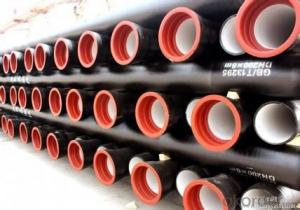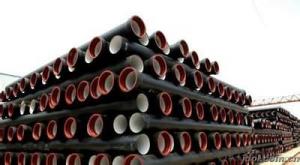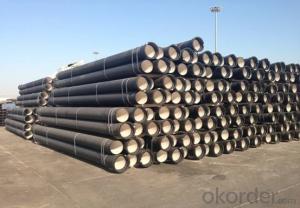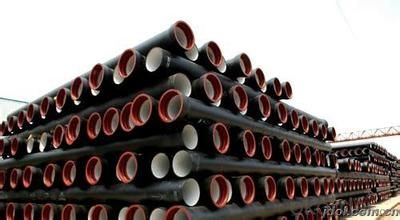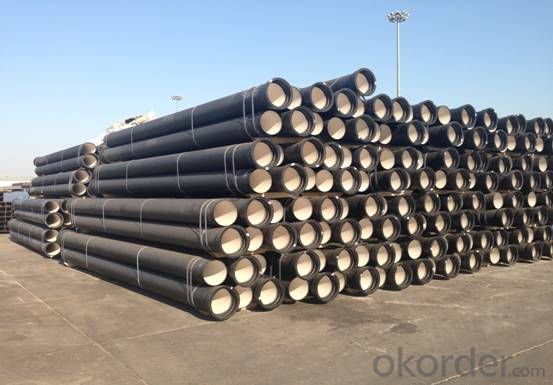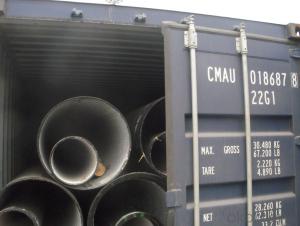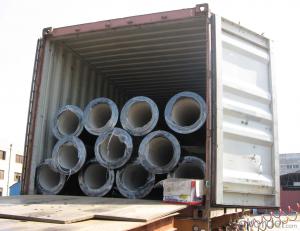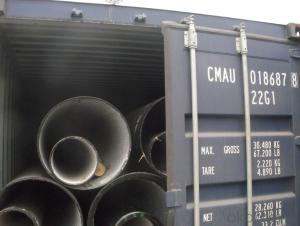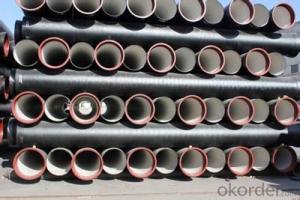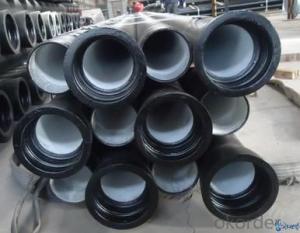DUCTILE IRON PIPE C Class DN900
- Loading Port:
- China Main Port
- Payment Terms:
- TT OR LC
- Min Order Qty:
- -
- Supply Capability:
- -
OKorder Service Pledge
OKorder Financial Service
You Might Also Like
Ductile Iron Cast Pipe is without any defects compare with tradition casting tech, which has many advantages particularly as follow:
(1) High density. In the "vertical upward casting" process, the melt iron of centre liquid column in center crystallizer is continuously feeding for volume shrinkage caused by condensation tube at outer circumference , which lead to be free of shrinkage porosity.
(2) High purity. When melt iron pouring, the mixed impurities such as gas, dross, sand grain which are lighter than melt iron could be eliminated at furnace mouth, its impossible to enter into the crystallizer through the channel, so the melt iron into the crystallizer is very pure.
(3) Strength with toughness. The cooling speed provided by continuous crystallizer is 30 times than sand casting and 5 times than centrifugal casting, and doesn't produce white iron, the eutectic cell volume of continuous cast iron is one eighth to one tenth compare with traditional cast iron. The density of graphite nodule in ductile iron can reach 300-700 pcs/mm2. Therefore, all reason above improve the strength and toughness of continuous cast iron.
(4) Free machining. The high speed cooling make the hardening phase (such as boride, steadite) not appear like reticular, massive or thick, but diffuse like fish bone and pane in shape, moreover, there are tiny graphite flakes inlaid hardening phase. It's free machining in BrinellHardness the range of 250-300HB. However, the Brinell Hardness of 250 is top limit to common metal materials.
(5) Uniform composition of tube wall. The convection mixing of liquid column caused by marching type drawing in crystallizer make the composition of tube wall well-distributed, and concentration gradient very little.
(6) High productivity. To the wall thickness of tube under 10mm, the speed of continuous casting is 1 meter/min, to the wall thickness of tube under 20mm, the speed of continuous casting is 0.5 meter/min, which is high efficiency that centrifugal or other casting tech couldn't reach.
- Q: What quota can be used for the installation of DN300 ductile iron pipes?
- Ductile iron quota, to see what works, such as the use of ductile cast iron bridge, to see the river length, through traffic, perennial water level to determine the ductile iron pipe length, diameter and number;
- Q: Can ductile iron pipes be used for above-ground installations?
- Yes, ductile iron pipes can be used for above-ground installations. They have excellent strength and durability, making them suitable for various applications, including above-ground installations where corrosion resistance and structural integrity are required.
- Q: How are leaks repaired in ductile iron pipe?
- Leak repairs in ductile iron pipes vary depending on the severity and location of the leak. One technique commonly used involves the application of epoxy-based sealants or leak repair clamps. For small leaks, epoxy sealants are commonly utilized. A specialized epoxy compound is applied to the leaking area, which then hardens and forms a durable seal. The epoxy is carefully spread on the pipe's surface, covering the leak and any surrounding damage. This method effectively addresses small leaks and offers a long-lasting solution. In cases where the leak is larger or more severe, leak repair clamps are often utilized. These clamps secure tightly around the pipe using rubber gaskets and bolts to provide a mechanical seal. The clamp's pressure compresses the gasket onto the pipe, creating a watertight seal and preventing further leakage. Leak repair clamps come in various sizes to accommodate different pipe diameters. Proper preparation of the pipe surface is crucial before applying either repair method. The area around the leak must be thoroughly cleaned and dried to ensure good adhesion of the epoxy or proper sealing with the clamp. It is also essential to adhere to the manufacturer's instructions and guidelines for the chosen repair method to achieve a successful and long-lasting repair. It is important to note that these repair methods are temporary solutions and may not be suitable for all situations. In cases of extensive pipe damage or aging infrastructure, it may be necessary to replace the affected pipe section entirely. It is recommended to seek professional assessment and guidance from qualified technicians or plumbers when dealing with leaks in ductile iron pipes. This ensures proper repairs and minimizes the risk of future issues.
- Q: How does ductile iron pipe perform in areas with high soil consolidation?
- In areas characterized by significant soil consolidation, the performance of ductile iron pipe is outstanding. This is because ductile iron possesses inherent strength and flexibility, making it an ideal choice for underground installations where soil consolidation is prevalent. The ground in areas with high soil consolidation often undergoes substantial movement and settling, presenting challenges for buried infrastructure. However, ductile iron pipe's unique characteristics enable it to withstand these conditions effectively. To begin with, the high tensile strength of ductile iron allows it to resist external forces and pressures exerted by the surrounding soil. This strength ensures that the pipe maintains its structural integrity even in areas with high soil consolidation. Furthermore, ductile iron exhibits exceptional resistance to deformation, enabling it to handle ground movement without cracking or breaking. Its flexibility allows the pipe to absorb lateral forces associated with soil consolidation, preventing any damage. Additionally, ductile iron pipe is renowned for its durability and long service life. It is highly resistant to corrosion, abrasion, and chemical attacks, further enhancing its performance in areas with high soil consolidation. This resistance guarantees that the pipe remains intact and fully functional, even in challenging soil conditions. Moreover, the joints of ductile iron pipe are designed to provide secure and leak-free connections. This eliminates the risk of soil infiltration, which can exacerbate soil consolidation and lead to further ground movement. In conclusion, ductile iron pipe is exceptionally suited for areas with high soil consolidation due to its strength, flexibility, durability, and leak-free joints. Its ability to withstand ground movement and maintain structural integrity makes it a reliable choice for underground installations in such conditions.
- Q: What is the expected joint deflection of ductile iron pipes?
- The expected joint deflection of ductile iron pipes depends on various factors such as the diameter of the pipe, the type of joint used, and the specific conditions of the installation. In general, ductile iron pipes are designed to accommodate some degree of deflection at the joints to allow for flexibility and movement. The American Water Works Association (AWWA) provides guidelines for the maximum allowable joint deflection for ductile iron pipes. According to AWWA C151/A21.51, the maximum deflection at the joint should typically not exceed 3 degrees or 1% of the nominal pipe diameter, whichever is greater. It is important to note that joint deflection should be within the specified limits to ensure the structural integrity and performance of the pipeline system. Excessive joint deflection can lead to leaks, failures, and reduced lifespan of the pipes. To determine the exact expected joint deflection for a specific installation, it is best to refer to the manufacturer's specifications and guidelines, as they may vary depending on the pipe size, joint type, and other factors. Consulting with a qualified engineer or contacting the manufacturer directly can provide more accurate information tailored to the specific project requirements.
- Q: The difference between ductile iron pipe and steel pipe used in pipe jacking
- The casting processes of nodular cast iron pipes are continuous casting, hot die casting and water-cooled centrifugal casting, in which water cooling is the most advanced process in the world,
- Q: How does ductile iron pipe perform in areas with high soil compaction?
- Ductile iron pipe performs well in areas with high soil compaction due to its strong and durable characteristics. Its flexible nature allows it to withstand the pressure exerted by compacted soil, preventing deformation or damage. Additionally, the material's high tensile strength and resistance to cracking make it an ideal choice for areas where soil compaction is a concern.
- Q: Can ductile iron pipes be used in areas with high levels of heavy metal contamination?
- Ductile iron pipes can indeed be used in areas with high levels of heavy metal contamination. Ductile iron is a strong and durable material that is resistant to corrosion, making it suitable for various environmental conditions, including areas with heavy metal contamination. The high levels of heavy metals in the surrounding soil or water do not affect the structural integrity or performance of ductile iron pipes. These pipes have a protective lining, usually made of cement mortar or polyethylene, which acts as a barrier between the pipe and the surrounding environment. This lining prevents the heavy metals from leaching into the water flowing through the pipes. Furthermore, ductile iron pipes have been proven to be highly resistant to chemical corrosion, including the corrosion caused by heavy metals. They have been extensively used in industrial applications where heavy metal contamination is common, such as wastewater treatment plants, industrial facilities, and mining sites. However, it is important to note that while ductile iron pipes can withstand high levels of heavy metal contamination, regular monitoring and maintenance are still necessary. This ensures that the protective lining remains intact and any potential issues are addressed promptly. In summary, ductile iron pipes are a suitable choice for areas with high levels of heavy metal contamination. Their strength, durability, and resistance to corrosion make them reliable for transporting water and other fluids, even in challenging environments.
- Q: What is the DN400 installation charge for ductile iron pipes?
- Labor cost: refers to the total amount of wages according to the provisions of the payment to the construction and installation works in the production of workers and ancillary production units of workers costs.
- Q: Are ductile iron pipes resistant to sulfuric acid corrosion?
- Yes, ductile iron pipes are generally resistant to sulfuric acid corrosion. Ductile iron is a strong and durable material that contains a high percentage of iron, making it less susceptible to the corrosive effects of sulfuric acid compared to other materials like cast iron or steel. However, it is important to note that the level of resistance can vary depending on factors such as the concentration and temperature of the sulfuric acid, as well as the duration of exposure. In highly concentrated or elevated temperature environments, additional protective measures such as lining the pipes with suitable materials or employing corrosion inhibitors may be necessary to ensure long-term resistance to sulfuric acid corrosion.
Send your message to us
DUCTILE IRON PIPE C Class DN900
- Loading Port:
- China Main Port
- Payment Terms:
- TT OR LC
- Min Order Qty:
- -
- Supply Capability:
- -
OKorder Service Pledge
OKorder Financial Service
Similar products
Hot products
Hot Searches
Related keywords
